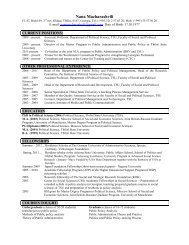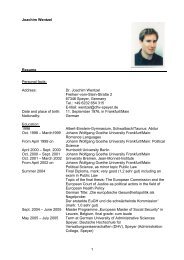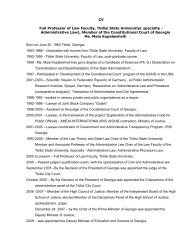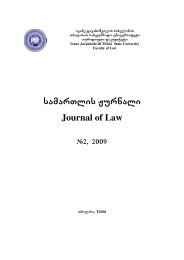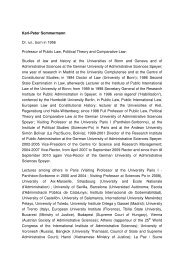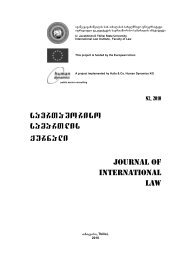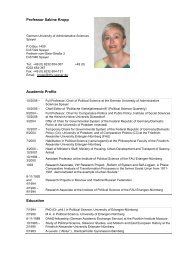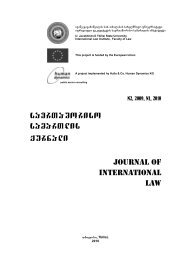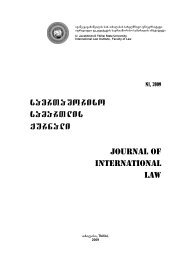Untitled
Untitled
Untitled
Create successful ePaper yourself
Turn your PDF publications into a flip-book with our unique Google optimized e-Paper software.
saerTaSoriso samarTlis Jurnali, #1, 2008 JOURNAL OF INTERNATIONAL LAW, N1, 2008<br />
ternational Covenant on Civil and Political<br />
Rights have explicit content of the universal<br />
principels – the principle of fair trial, the presumption<br />
of innocence, a right to legal personality,<br />
etc. Therefore, Article 84 of the Constitution,<br />
establishing that “a judge … in his/<br />
her activities … is bound by the Constitution<br />
and a law”, must be widely interpreted. A judge<br />
must be guided by the universally recognized<br />
principles and norms and general principles<br />
as the latter possess the primacy over the<br />
Constitution and laws of Georgia, and by international<br />
treaties, provided that they do not<br />
contradict with the Constitution of Georgia.<br />
Therefore, the primacy of the universally recognized<br />
principles of international law over the<br />
domestic law, recognized by the Constitution<br />
of Georgia, grants a possibility to law applying<br />
bodies not to be bound by the legislative<br />
basis created unilaterally by a state. On its<br />
turn, a state is obliged to establish the legislative<br />
basis in line with the universally recognized<br />
principles and norms. As a matter of fact<br />
the primacy of universally recognized principles<br />
and norms vis-à-vis the domestic legislation<br />
does not create a hard collision situation<br />
(unlike the treaty law), as the universal principles<br />
operate as regulator, the basis of the<br />
public relations within a state, upon which the<br />
legislation should be built. The legal boundaries<br />
of the universal principles and norms are<br />
not clearly identified, and this has to be taken<br />
into consideration by the legislator. In practice<br />
this means that judicial bodies may make<br />
decisions based on the domestic legislation,<br />
but this does not hamper them to be guided<br />
by the respective international norms, especially<br />
when the latter broaden or specify the<br />
provision of the Constitution or a law.<br />
Georgia is one of the first states in the Eastern<br />
European and CIS area which still before<br />
the dissolution of the Soviet Union, right upon<br />
the restoration of independence, with the Act of<br />
Independence (09/04/1991) recognized the primacy<br />
of international law over the Georgian legislation.<br />
However the reinforcement of this provision<br />
was possible only in the 1995 Constitution<br />
through the Article 6 and Article 7.<br />
Therefore, the contemporary international<br />
law is the unity of norms with the general<br />
democratic content, reflecting the objective<br />
pattern of the development of mankind. If international<br />
law at the initial stage of the formation<br />
represented ephemeral system, today<br />
it is established as a positive legal system,<br />
which is the guarantee of peaceful development<br />
of the world legal order. If in the past the<br />
will of a state dominated in directing international<br />
relations, today a state is obliged to<br />
comply with the legal order, which is reflected<br />
in international law by the world community. It<br />
is not by conicidence that in the new political<br />
reasoning along with the concepts such as the<br />
priority of the general values and interests of<br />
mankind, the unity of the world and interrelation<br />
of states, the freedom of the choice of<br />
ways of development, the concept of the primacy<br />
of international law becomes increasingly<br />
establsihed in international relations.<br />
The contemporary international law increasingly<br />
intrudes into the fields which in the past<br />
strictly belonged to the internal regulation of<br />
sovereign states. Today the primacy of international<br />
law, i.e. the universally recognized principles<br />
and norms of international law, are not only<br />
the supreme legal postulates of the relations of<br />
subjects of international law, and mainly states,<br />
but it stands higher than domestic legal systems<br />
of states. The international and constitutional<br />
practice of states includes very interesting theoretical<br />
normative practice and case law.<br />
Even though states choose themselves<br />
which of the concepts to follow, at the current<br />
stage the problem of monism-dualism carries<br />
more theoretical character, as the state bodies<br />
both – adminsitrative and judicial shall decide<br />
the same problems in both cases. At the current<br />
stage international law not only influences state<br />
systems, even more, in some cases a state is<br />
compelled to consider and take into account the<br />
norms of generally recognized norms of international<br />
law.<br />
1<br />
H. Triepel. Völkerrecht und Landesrecht. Leipzig , 1899, s. 89; The same author: "Droit<br />
international et droit interne. Fondation Carnegie 1920, pp. 78-81; Les rapports entre le<br />
droit inetrnational et le droit inetrnational – "Recueil des Cours", the Hague Academy of<br />
"International La w", 1923. t. 1, p. 83-103.<br />
30



